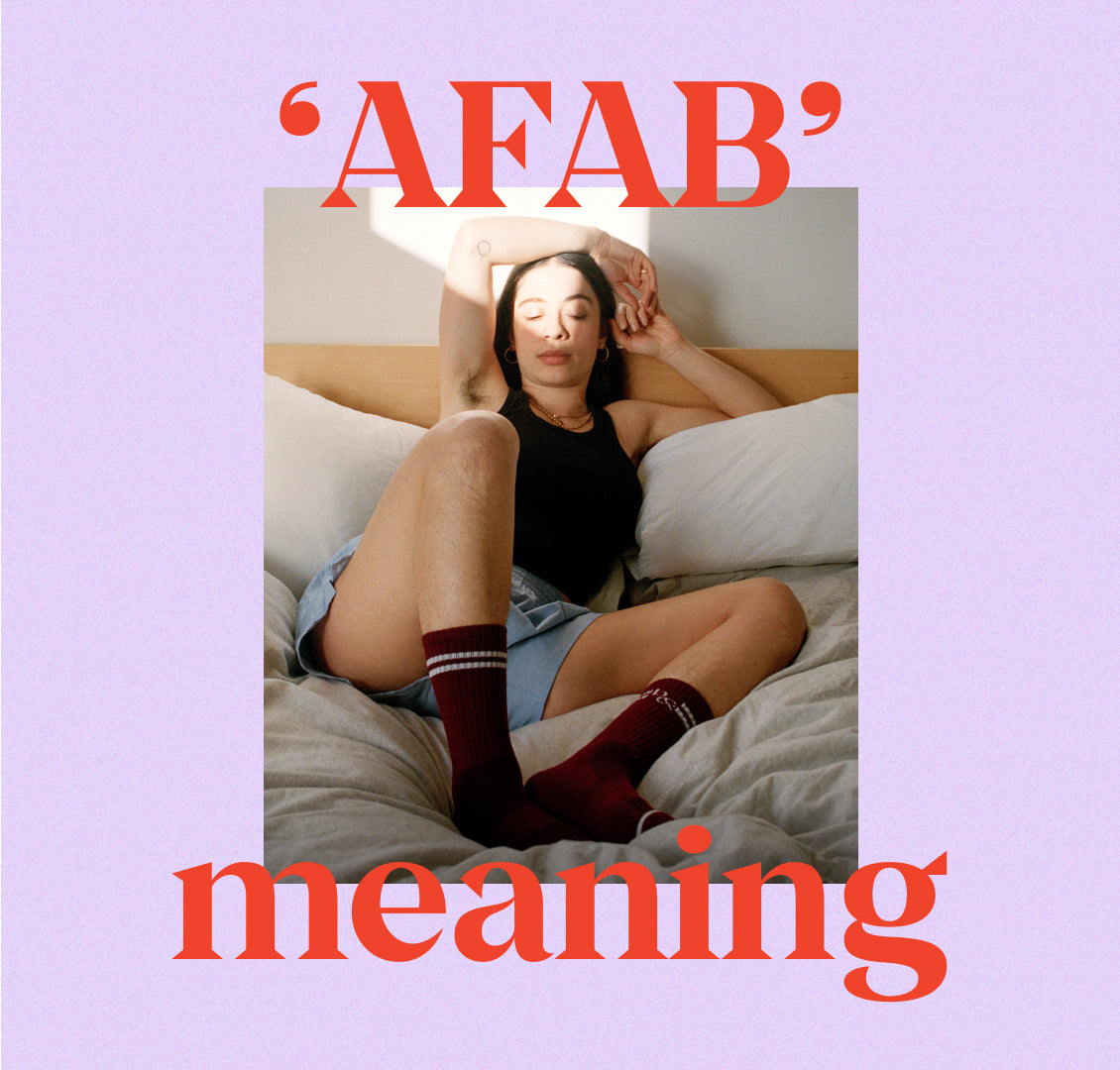
May 3, 2024
AFAB meaning
Finnegan Shepard
AFAB meaning, usages, and cultural response.
I was born in the 1990’s. That means that for me, growing up, there was little to no language commonly circulated around gender queer identities.
In fact, when I try to think back to remember what terms I DID actually hear, I can’t even remember. I’m sure that I had heard the term ‘transexual,’ because that lived in my brain as this scary, shiny thing, something I was afraid to look too closely at. But I didn’t hear the term AFAB until much later, when I was beginning my own transition.
It’s been interesting for me to see the ways in which the term is and isn’t used, and how subsets of the community respond positively and negatively to it. But before we go too far into that, let’s start with an afab definition.
What Does AFAB Mean?
AFAB stands for ‘assigned female at birth.’ While this might seem simple, there’s a lot to unpack here.
First off, the term carries within it an implicit tension. By using the word 'assigned', it implies that someone gave or placed a sex upon another party. This is important, because many people who use AFAB as a term do so in contradiction to the sex assigned at birth–that is, they identify as male, masc, gender queer, nonbinary, etc.
The term also implicitly delineates the difference between sex and gender. It points to the fact that when we are born and categorized under a male or female sex, that doesn’t necessarily correlate with our gender identity.
Who Uses The Term AFAB?
As mentioned above, AFAB is a pretty wide definition. Cisgender women are AFAB, though it’s rare for them to actively use the term.
This has to do with what we talked about in the prior section. Cisgender women are assigned female at birth, but they also identify as female. There's no tension between the two, so they tend to just identify as 'women.' Some cisgender women use AFAB as a term from a position of ally-ship.
AFAB is more frequently used by trans men, nonbinary, transmasc or gender queer people who are using the term to help establish groupings or specific needs that are common amongst them. For instance, AFAB is a helpful term when talking about design, because certain design needs for AFAB people are different from design needs for AMAB (assigned male at birth) people.
At Both&, we are designing clothing for AFAB people who want a masculine silhouette. This is a useful term because to claim that we are ‘nonbinary’ clothing in general would be misleading to nonbinary folks who are AMAB. Our clothing simply wouldn’t fit AMAB nonbinary well. To learn about what makes clothing optimized for a masc, AFAB fit, we recommend this essay on FTM and AFAB fashion. Alternatively, explore how to mix masculine and feminine style elements here.
AFAB people, whether they have had surgery or taken testosterone or not, share certain similarities from a design perspective. In general we are shorter, have wider hips, and carry more fat around the hips, bum, and thighs. When designing gender affirming clothing for folks in this category, the proportions need to be optimized for these specific and shared needs.

Pushback On The Term AFAB
Over the last few years, there has been more pushback on the term AFAB, especially by younger generations. The argument is that the term is giving too much emphasis to sex assigned at birth rather than the chosen gender identity of the person in question.
By focusing on the past/what the person is moving away from, there is the risk of increasing dysphoria and a feeling of disempowerment, rather than honoring and celebrating the person’s identity in the present moment.
While anecdotal, it is interesting to note that this division in opinion does seem to occur on generational lines. Millennials and older tend to be more comfortable with the term, whereas Gen Z and Gen Alpha seem to be more resistant to it.
Usage Of AFAB
Above, we mentioned clothing design as a space in which the term AFAB is useful. To continue fleshing that example out, AFAB is a helpful term because it is inclusive in the right way, and doesn’t mislead anyone.
A wide variety of people shop from Both&, including people who identify as trans men, transmasc, nonbinary, gender queer, and cisgender women who like a masculine silhouette. When explaining a fit system, it is not feasible to list out a catalogue of identities that might enjoy the fit, for a variety of reasons–clunkiness of language, limitation of characters in many spaces, and the fact that identities are constantly shifting.
The term AFAB, however, is an umbrella term that quickly signals exactly for whom a design has been made. Clothing is one use case for this, but really anytime a product or service is made specifically with certain needs in mind, the term is a helpful grouping.
Another way in which people use the term AFAB is as a grouping in the sense of a common experience. Again, this is less common amongst younger generations, but part of the joy of being in community is feeling a shared experience. For some folks, AFAB is a term that carries the weight and importance of that shared experience.
AFAB Nonbinary
Can you be AFAB and nonbinary? We receive this question a surprising amount. The short answer is yes, absolutely. Again, AFAB is correlated to sex assigned at birth. Nonbinary is a gender identity. Specifically, it is a gender identity that either identifies with both male and female identity, or with neither.
Regardless, everyone is assigned a sex at birth. (Yes, there are all sorts of deviations from binary sex at birth, but for the purposes of this essay, we won't dive into the nuance there). AFAB nonbinary people are simply people who were assigned female at birth and identify as nonbinary. Using AFAB may be a helpful grouping for them, or it may not. This goes back to the usages section above.
Final Thoughts
The queer community is an incredibly creative community. That is wonderful–we are always breaking through new frontiers, defining and redefining new ways of being and identifying in the world. AFAB is just one term among many, and some people might find it useful and feel that it resonates, while others might not. The most important thing is to respect other people’s journey’s, respect your own, and stay open in your exploration of what feels right.



